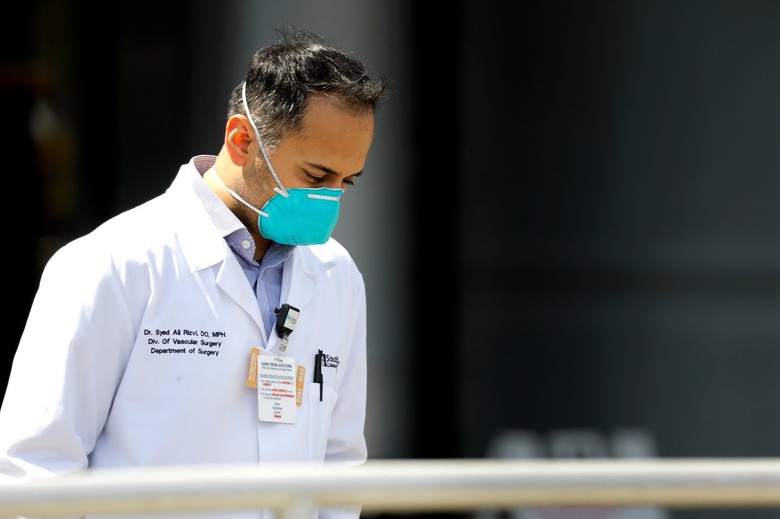This Startling Discovery Might Protect Men From Coronavirus
- Doctors studying cohorts of cancer patients who were infected with the novel coronavirus made a startling discovery.
- Men with prostate cancer who were under androgen-deprivation therapy were less likely to get COVID-19, and less likely to develop a severe case if they were infected.
- The researchers think ADT therapy may protect men from the novel coronavirus.
- Visit BGR's homepage for more stories.
With each day that goes by, we keep hearing of novel coronavirus therapies that can speed up recovery time and potentially reduce the risk of complications and death. It seems like doctors are throwing everything at the disease to see what sticks, but that's not exactly the case. They've simply had time to observe that some of the drugs that were created for other ailments can help COVID-19 patients as well. One such example is remdesivir, which was developed for Ebola but never used to treat it. Then there's the controversial hydroxychloroquine, a decades-old anti-malarial that can help some COVID-19 patients, but it's not as effective and safe as people would have hoped. Anti-viral favipiravir (Avigan) was made for influenza but it might work on COVID-19 as well. And if this new study is right, a treatment that's usually given to prostate cancer patients could be used to protect men from the novel coronavirus.
Cancer is the kind of preexisting medical condition that might worsen the impact of the COVID-19 disease on patients. With that in mind, it's not surprising that doctors paid close attention to their cohorts of cancer patients who were infected with the new virus. Researchers from Switzerland and Italy penned a new study that shows androgen-deprivation therapy (ADT) for prostate cancer would actually protect men from the novel coronavirus infection.
Published in the leading cancer journal Annals of Oncology, the study details this startling discovery. Researchers found that patients receiving ADT drugs were less likely to develop COVID-19, and the disease was less severe following an infection. The study says that out of 4,532 men in the Veneto region of Italy, 430 had cancer, with 118 of them having prostate cancer. Men with cancer had a 1.8x higher risk of COVID-19 infection compared to the male population without the ailment, and they developed a more severe form of the disease, the report says.
But when they looked at the entire population of prostate cancer patients in the Veneto region, they found that only four men out of 5,273 patients on ADT were infected with the novel coronavirus, and none of them died. That's the kind of unusual statistical discrepancy that warrants more research.
37,161 men who have the same kind of cancer were treated with other therapies. Of those, 114 got COVID-19 and 18 died. Of the 79,661 patients with other types of cancer, 312 were infected, and 57 died.

The researchers now believe that men who do not have prostate cancer can be treated with ADT to either prevent COVID-19 symptoms or reduce the severity of the disease after infection.
"I hope that our findings inspire other clinicians to carry out clinical trials using transient ADT in men infected with COVID-19, in addition to other experimental therapies," Swiss Università della Svizzera Italiana professor Andrea Alimonti said. "Although these data need to be further validated in additional large cohorts of patients with COVID-19, they provide an answer to the hypothesis that androgen levels can facilitate coronavirus infections and increase the severity of symptoms, as has been seen in male patients."
The Swiss and Italian researchers were motivated to look into this potential therapy following recent research that said a protein called TMPRSS2 from the family of Type II Transmembrane Serine Proteases could help the virus infect human cells. TMPRSS2 can be found in other places such as the lungs, which is where the novel coronavirus replicates the most, with potentially fatal consequences.
ADT drugs target androgen receptors, which regulate the high levels of TMPRSS2 in the prostate. Therefore, ADT can also regulate TMPRSS2 levels in the lungs and potentially reduce the virus's capability to infect cells. The ADT therapy would not last longer than a month and should have no significant side effects, Alimonti said. "For instance, luteinizing hormone-releasing hormone, or LH-RH, antagonists can decrease the levels of testosterone in patients in 48 hours, and the effect of this therapy is transient. Once a patient stops taking the drug, his testosterone levels go back to the previous levels."
As with other coronavirus research, the cancer study will require additional research to see whether ADT drugs in COVID-19 patients who don't have cancer actually works. But the research doesn't only offer a potential treatment for men, it also explains why men might develop worse COVID-19 forms.
"This could explain why men infected by COVID-19 develop a more aggressive form of disease than women," Alimonti said. "It is known that ADT can decrease the levels of TMPRSS2 in prostate cancer patients, and some experimental evidence demonstrates that this could happen not only in the prostate but also in other tissues. So I wanted to see if ADT could decrease the risk of developing coronavirus infection in men with prostate cancer."
That may not be the sole explanation, as other studies show the virus does affect the testes directly. A recent study suggested that ACE2 receptors in the testicles explain why men are more likely than women to develop severe cases of COVID-19. Another report even showed that the virus can be present in semen, suggesting that sexual transmission could be a theoretical risk.
